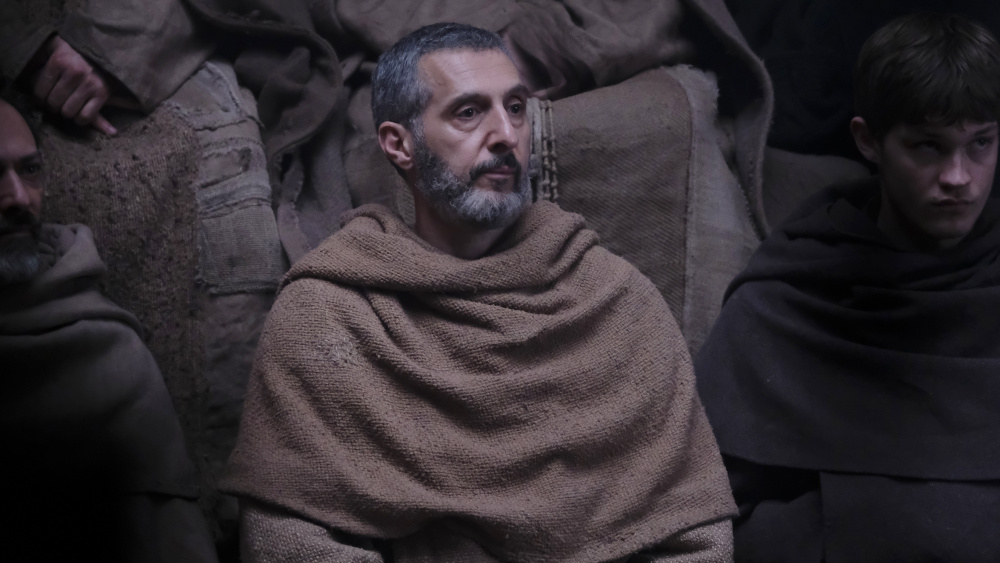The name of the rose – The miniserie
The names of the rose
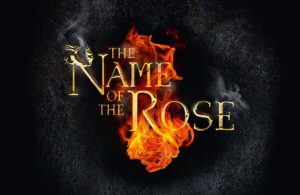 The first time I heard of “The Name of the Rose” was in the early 1980s, shortly after the publication of Umberto Eco’s novel. The book caused furor worldwide either by its interesting story or numerous references to the evident connection of the protagonist Guilherme de Baskerville with the iconic Sherlock Holmes, detective created by Conan Doyle.
The first time I heard of “The Name of the Rose” was in the early 1980s, shortly after the publication of Umberto Eco’s novel. The book caused furor worldwide either by its interesting story or numerous references to the evident connection of the protagonist Guilherme de Baskerville with the iconic Sherlock Holmes, detective created by Conan Doyle.
One day, I was talking to a very dear uncle, equally lover of movies and literature. Upon hearing some commentary on TV, he reported that he had gone to visit a friend in the hospital, and saw Umberto Eco’s book beside the patient. The first thing his friend said to him was not to tell any spoiler, because he was loving the book and eager to know the end of the story. My uncle agreed, and commented that they were already making the movie somewhere in Germany, and that they had built a library just to burn it down in the end. The friend almost strangled my uncle, and while he told me this between laughs, I had to remind him that I had not reached the end of the book myself …
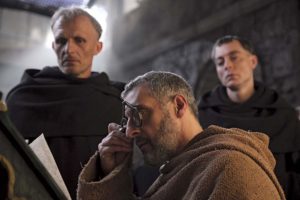 Well, spoilers aside, the famous library is burned in the book, in the eponymous film by Jean-Jacques Annaud (“Der Name der Rose”, ALE / ITA / FRA, 1986), and in the very recent miniseries “The Name of the Rose” ( ITA / ALE, 2019). Perhaps this is the only point in common, since they are three different works, trying to tell the same story.
Well, spoilers aside, the famous library is burned in the book, in the eponymous film by Jean-Jacques Annaud (“Der Name der Rose”, ALE / ITA / FRA, 1986), and in the very recent miniseries “The Name of the Rose” ( ITA / ALE, 2019). Perhaps this is the only point in common, since they are three different works, trying to tell the same story.
The book “The Name of the Rose” certainly is the masterpiece of Umberto Eco, a genius with words, who left us a rich work in historical data of a particular epoch of the History of the Humanity, with a profusion of details that takes the breath away from the reader just in the first chapters.
Turning six hundred pages of literature into film is an almost impossible task, since they are different languages, and you have to translate into images scenes that are recreated from words in each reader’s brain. In addition, it is necessary for the screenwriter to have a fantastic power of synthesis, to be able to condense in only 130 minutes the main points of the novel, eliminating the redundancies of the literature and making it easier for the editor to adjust it to a pleasant and surprising rhythm.
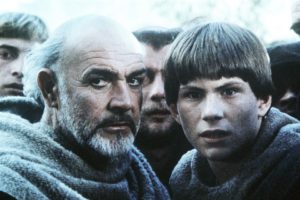 There is no doubt that Annaud’s movie, starring Sean Connery and Chistian Slater, took its place in the pantheon of great film works, earning fifteen awards and five nominations. Of course there were points in the book that were left out in the movie, but this is part of the process of translating literature into film. Sean Connery managed to embody the character William of Baskerville in such a way that it was uncomfortable and almost impossible for any other actor to repeat the role.
There is no doubt that Annaud’s movie, starring Sean Connery and Chistian Slater, took its place in the pantheon of great film works, earning fifteen awards and five nominations. Of course there were points in the book that were left out in the movie, but this is part of the process of translating literature into film. Sean Connery managed to embody the character William of Baskerville in such a way that it was uncomfortable and almost impossible for any other actor to repeat the role.
When I learned that a miniseries with the same theme had been made, I confess I was torn about it. I love the book and the 1986 movie, so I was already afraid of what that transposition would be like for television, as it was produced by Italian RAI, with American actors and spoken in English.
 Considering the depth of Umberto Eco’s work, there is no doubt that the miniseries format would allow to better explore all the nuances of the original story. However, what was seen on the screen was the addition of parallel stories that had little to do with the main plot. New characters were introduced, with no importancy in the story, and were discarded without major concerns.
Considering the depth of Umberto Eco’s work, there is no doubt that the miniseries format would allow to better explore all the nuances of the original story. However, what was seen on the screen was the addition of parallel stories that had little to do with the main plot. New characters were introduced, with no importancy in the story, and were discarded without major concerns.
And even having a huge space, since there were ten chapters with an hour each, were still summarized and simplified excerpts from the original story that were even better in Annaud’s movie.
John Turturro tries hard to create a Baskerville with his own identity, but besides being difficult to compete with the image of the character of Sean Connery, his own limitations prevent him from achieving a better result. Rupert Everett has no better luck than the villainous Bernardo Gui, creating a shallow and uncreative character.
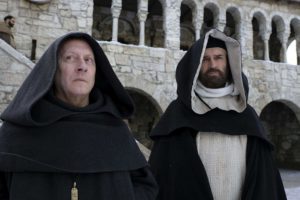 And speaking about creativity, there have been some disturbing changes in history in relation to the book. The end of the mini-series brings a different destiny to some characters, which suggests that other seasons may emerge. Obviously, the story will have to be another, since everything written by Eco would already be exhausted in the ten episodes. Whatever comes, if it comes, will be on the screenwriters’ account.
And speaking about creativity, there have been some disturbing changes in history in relation to the book. The end of the mini-series brings a different destiny to some characters, which suggests that other seasons may emerge. Obviously, the story will have to be another, since everything written by Eco would already be exhausted in the ten episodes. Whatever comes, if it comes, will be on the screenwriters’ account.
It is possible that a viewer who has never read the book or seen Annaud’s movie will like the miniseries. It is a story with comings and goings, murders and secrets, historical references and even a few doses of criticism about religion’s relation to money. Anyway, “The Name of the Rose” is as good or better than many serials that flood streaming and subscription channels. If interested, watch, but you already know that the library catches fire in the end!

